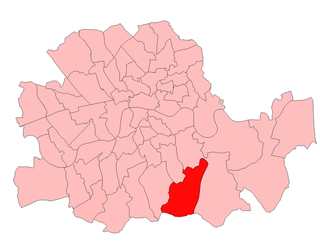Related Research Articles
There were two elections in Ireland on 24 May 1921, following the establishment of the House of Commons of Northern Ireland and the House of Commons of Southern Ireland under the Government of Ireland Act 1920. New constituencies were established for both parliaments. A resolution of Dáil Éireann on 10 May 1921 held that these elections were to be regarded as elections to Dáil Éireann and that all those returned at these elections be regarded as members of Dáil Éireann. According to this theory of Irish republicanism, these elections provided the membership of the Second Dáil. The Second Dáil lasted 297 days.

The 1933 Northern Ireland general election was held on 30 November 1933. Like all previous elections to the Parliament of Northern Ireland, it produced a large majority for the Ulster Unionist Party.

The 1929 Northern Ireland general election was held on 22 May 1929. Like all previous elections to the Parliament of Northern Ireland, it produced a large majority for the Ulster Unionist Party. It was the first held after the abolition of proportional representation and the redrawing of electoral boundaries to create single-seat constituencies. As with the rest of the United Kingdom, this has made it more difficult for independent and minor party candidates to win seats.

Belfast Windsor was a constituency of the Parliament of Northern Ireland.

Enniskillen was a constituency of the Parliament of Northern Ireland.

North Londonderry was a county constituency comprising the northern part of County Londonderry. It was created in 1929, when the House of Commons Act 1929 introduced first-past-the-post elections throughout Northern Ireland. It was created in 1929 as one of five single-member constituencies replacing the former five-member Londonderry constituency. The constituency survived unchanged, returning one member of Parliament until the Parliament of Northern Ireland was temporarily suspended in 1972, and then formally abolished in 1973.
The 1921 Orkney and Shetland by-election was a parliamentary by-election held for the British House of Commons constituency of Orkney and Shetland on 17 May 1921.
The 1954 Armagh by-election was held on 20 November 1954, following the resignation of Ulster Unionist Party Member of Parliament James Harden.

The 1921 Lewisham West by-election was a by-election held on 13 September 1921 for the British House of Commons constituency of Lewisham West.
The 1912 Hythe by-election was a Parliamentary by-election held on 11 June 1912. The constituency returned one Member of Parliament (MP) to the House of Commons of the United Kingdom, elected by the first past the post voting system.
The 1914 Belfast East by-election was held on 6 April 1914. The by-election was held due to the death of the incumbent Irish Unionist MP, Robert McMordie. It was won by the Irish Unionist candidate Robert Sharman-Crawford, who was unopposed.
The 1891 West Derbyshire by-election was a parliamentary by-election held for the British House of Commons constituency of West Derbyshire on 2 June 1891.
The February 1922 North Down by-election was held on 21 February 1922. The by-election was held due to the appointment of the incumbent Ulster Unionist Party MP, Thomas Watters Brown, as a judge to the High Court of Justice in Northern Ireland. It was won unopposed by the Ulster Unionist Party candidate Henry Hughes Wilson. Wilson was assassinated four months later, leading to the July 1922 North Down by-election.
The 1921 Mid Armagh by-election was held on 23 June 1921. The by-election was held due to the death of the incumbent Ulster Unionist MP, James Rolston Lonsdale. It was won unopposed by the UUP candidate Henry Bruce Armstrong.
The 1918 Mid Norfolk by-election was held on 23 October 1918. The by-election was held due to the death of the incumbent Liberal Unionist MP, William Lewis Boyle. It was won by the Conservative candidate Neville Jodrell, who was unopposed due to a War-time electoral truce.
The 1916 North Fermanagh by-election was held on 27 October 1916. The by-election was held due to the resignation of the incumbent Irish Unionist MP, Godfrey Fetherstonhaugh. It was won by the Irish Unionist candidate Edward Archdale who was unopposed due to a War-time electoral pact.
The 1916 St George, Hanover Square by-election was held on 11 January 1916. The by-election was held due to the elevation to the peerage of the incumbent Conservative MP, Sir Alexander Henderson. It was won by the Unionist candidate Sir George Reid, the former Prime Minister of Australia, who acted as a spokesman for the self-governing Dominions in supporting the war effort. He was unopposed. There was a history of unopposed by-elections in the constituency and the War-time electoral pact meant that the other major parties would not endorse candidates in that election.
The 1916 South Tyrone by-election was held on 28 February 1916. The by-election was held due to the death of the incumbent Irish Unionist MP, Andrew Horner. It was won by the Irish Unionist candidate William Coote, who was unopposed.
The 1911 Birmingham South by-election was held on 3 May 1911. The by-election was held due to the incumbent Liberal Unionist MP, Charles Howard, becoming the tenth Earl of Carlisle. It was won by the Liberal Unionist candidate Leo Amery, who was unopposed.
In 1863, amid the American Civil War, two gubernatorial elections were held as a result of this dispute, a Confederate election and a Union election.
References
- ↑ Leigh Rayment's Historical List of MPs
- ↑ "Unionist Unopposed" . Hull Daily Mail. 23 June 1921. Retrieved 27 July 2016– via British Newspaper Archive.